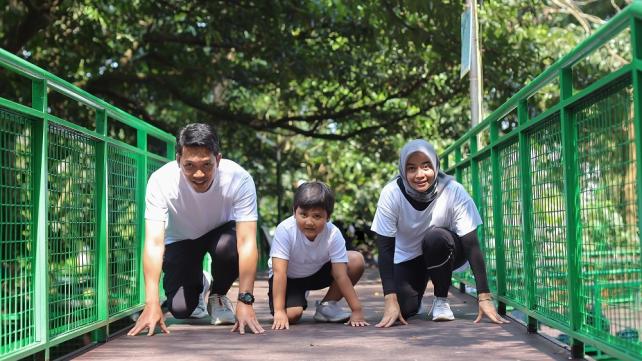
We know that physical fitness is important for people of all ages, but what if we have a child who really balks at the idea of exercise? While many kids are eager to join sports teams or run around with friends outside, some are more sedentary, and others downright refuse to get off the couch. There can be many reasons why kids feel averse to physical activity, but with collaboration and creative thinking, you can probably find some agreeable ways to get their bodies moving.
If your child is resisting the idea of exercise, consider these possibilities:
Some kids lack confidence.
There are a number of factors that could make a child lack confidence in their physical abilities:
- Perhaps a coach or another child has told them that they are uncoordinated or clumsy.
- Maybe they’re always the last to be picked for a team at school.
- Some children have disabilities (either diagnosed or undiagnosed) that affect coordination and gross motor skills.
- For others, the intense competitiveness of sports makes them anxious.
Whatever the reason, a lack of confidence is sometimes the root of a child’s exercise avoidance.
If the topic of physical fitness seems unpleasant, stressful, or seemingly impossible to your child, try to find out why. Listen compassionately and hear his/her concerns without dismissing or belittling them.
“Children who aren't naturally athletic may be self-conscious about their physical skills (or lack of them),” says Patricia Nixon, Ph.D., who conducts research on physical activity and children at Wake Forest University in Winston-Salem, North Carolina. “They may also fear public failure, embarrassment, or teasing. A child may just be physically cautious. These kids need all the support and cheerleading you can offer. Nagging or negative comments don't work and will only serve to make your child feel bad.”1
Instead of finding fault, point out the positives. “Praise a child for perfecting that handstand or figuring out how to pump those legs to swing high in the sky. Out-of-shape or uncoordinated children need to hear encouragement to reach even small goals, such as walking or biking further than last time. Remember, acknowledge the effort – choosing to be active or trying to improve a skill – rather than the outcome to help build your child's confidence,” says Eric Small, MD, a specialist in pediatric/adolescent sports medicine and author of Kids & Sports.
Some kids feel too pressured.
When they fear their child is becoming out of shape or overweight, some parents push fitness too intensely, and this strategy can backfire. “Don’t put too much pressure on them to exercise because they have to; find a way to make it enjoyable for them individually,” advises journalist Lindsey Ellefson. “If they love the sand between their toes, organize a beach volleyball game. If they love the water, get passes to the pool this summer. If they love nature, take them on a scenic hike … Kids can skip over that ‘I hate exercise’ phase entirely if you can identify the things they enjoy and incorporate those elements into the activities you plan for them.”2
For parents who were very athletic and/or competitive in their youth (or in the present), it can be difficult to relate to their children who aren’t sporty. Many times parents pressure their kids to play the same sports they did as children or to perform as well as they did. If your child is not athletic, this is one of those times when you have to accept that your kids are different from you – unique creations of Allah who have their own likes, dislikes, talents, and challenges. Just because you may have been your soccer team’s top scorer does not mean your children will follow in your footsteps or that they will even enjoy team sports, competition, or vigorous exercise at all. But chances are there are some activities they would enjoy, should you take the time to learn about their interests and strengths.
Some kids need a compromise.
For kids who prefer to unwind by watching TV, consider putting a small trampoline (also called a “rebounder”), a stationary bicycle, or a treadmill in the room and encourage them to bounce, pedal, or stroll as they watch. If they find exercise boring, they might be more amenable if a friend joins in, and if it’s pitched as “play time” rather than a “workout.” If they frequently complain that they’re too tired, encourage them to do just a little bit, and allow them to stop if they get exhausted. Even a small amount of low-impact exercise is better than none at all. When kids are not physically fit, it’s fine to start with moderate activities like walking, stretching, playing in a pool or on a playground, or moving their bodies to music. Their fitness and stamina will increase over time, but don’t rush it. Encouraging positive associations with moving their bodies should be the main goal for reluctant kids.
End Notes
1 Kid Fitness: When Your Child Won't Exercise
2 The Best Ways to Get Kids to Exercise When They Hate Team Sports
Laura El Alam is a freelance writer and editor and the author of the book Made From the Same Dough, as well as over 100 published articles. A wife and mother of five, Laura lives with her family in Massachusetts. You can visit her online at www.seaglasswritingandediting.com.



Add new comment